A Food Production Manager oversees the entire foodservice operation, ensuring quality control, managing inventory, and coordinating staff to meet production goals efficiently. In contrast, a Culinary Supervisor focuses primarily on kitchen staff supervision and workflow, maintaining culinary standards, and assisting with recipe development. Both roles require strong leadership skills but differ in scope, with the manager handling broader operational tasks and the supervisor concentrating on daily kitchen activities.
Table of Comparison
| Role | Food Production Manager | Culinary Supervisor |
|---|---|---|
| Primary Focus | Overseeing entire food production operations, ensuring efficiency and quality control | Managing kitchen staff and supervising daily cooking processes |
| Key Responsibilities | Menu planning, inventory management, cost control, compliance with food safety standards | Staff scheduling, training, maintaining kitchen hygiene, quality assurance of dishes |
| Typical Work Environment | Large-scale foodservice operations like cafeterias, catering companies, and food manufacturing | Restaurants, hotels, and smaller-scale kitchen settings |
| Required Skills | Leadership, budgeting, supply chain coordination, regulatory knowledge | Team supervision, culinary techniques, time management, communication |
| Education & Experience | Bachelor's degree in Foodservice Management or related field preferred; extensive operational experience | Proven culinary experience; certifications like ServSafe or culinary diplomas favored |
| Goal | Maximize production efficiency and profitability while maintaining food quality | Ensure consistent, high-quality food preparation and kitchen workflow |
Overview of Food Production Manager and Culinary Supervisor Roles
Food Production Managers oversee the entire food preparation process, ensuring quality control, efficiency, and compliance with health regulations in large-scale foodservice operations. Culinary Supervisors focus on managing kitchen staff, coordinating daily food preparation, and maintaining adherence to recipes and presentation standards. Both roles require strong leadership and organizational skills but differ in scope, with Food Production Managers handling broader operational responsibilities and Culinary Supervisors concentrating on direct kitchen management.
Key Responsibilities and Tasks
A Food Production Manager oversees inventory management, menu planning, and compliance with food safety regulations to ensure efficient kitchen operations and cost control. A Culinary Supervisor focuses on supervising kitchen staff, maintaining quality standards in food preparation, and coordinating daily cooking activities to deliver consistent culinary output. Both roles require strong leadership and communication skills but differ in scope, with the manager emphasizing operational strategy and the supervisor concentrating on hands-on kitchen management.
Leadership and Team Management
A Food Production Manager directs large-scale food operations, emphasizing strategic leadership and efficient resource allocation to maximize productivity and maintain quality standards. A Culinary Supervisor focuses on day-to-day team management in the kitchen, ensuring culinary staff follow recipes, safety protocols, and workflow processes for smooth service. Both roles require strong leadership skills but differ in scope, with the manager overseeing broader operational logistics and the supervisor handling direct team oversight.
Required Skills and Qualifications
Food Production Managers require strong leadership, inventory management, and budgeting skills, often holding degrees in food science or hospitality management, along with certifications like ServSafe or HACCP. Culinary Supervisors focus on culinary expertise, team coordination, and quality control, typically possessing culinary arts diplomas and experience in kitchen operations. Both roles demand excellent communication, time management, and knowledge of food safety regulations to ensure efficient foodservice delivery.
Decision-Making and Problem-Solving
Food Production Managers primarily focus on strategic decision-making involving resource allocation, production scheduling, and compliance with health regulations to optimize kitchen efficiency. Culinary Supervisors emphasize tactical problem-solving related to daily kitchen operations, staff coordination, and quality control to ensure consistent food standards. Both roles require strong leadership but differ in scope, with managers handling broader operational challenges and supervisors addressing immediate culinary issues.
Daily Operations and Workflow
A Food Production Manager oversees the entire food preparation process, ensuring efficient workflow, quality control, and adherence to safety standards throughout daily operations. The Culinary Supervisor focuses on managing kitchen staff, coordinating schedules, and maintaining consistency in food presentation and portion control. Both roles require strong organizational skills but differ in scope, with the Food Production Manager handling broader operational strategy and the Culinary Supervisor managing frontline kitchen activities.
Compliance and Food Safety
Food Production Managers oversee the entire food preparation process, ensuring strict compliance with health regulations and food safety standards to prevent contamination and maintain quality control. Culinary Supervisors focus on directing kitchen staff, implementing food safety protocols, and monitoring sanitation practices to meet industry compliance requirements. Both roles are critical in maintaining HACCP standards and adhering to local health codes in foodservice operations.
Career Path and Advancement Opportunities
Food Production Managers typically advance through roles in kitchen management and food service operations, gaining expertise in large-scale food preparation and supply chain coordination, which positions them for executive roles such as Director of Food Services. Culinary Supervisors often progress from chef positions, honing skills in team leadership and kitchen workflow management, which can lead to roles like Executive Chef or Restaurant Manager. Both career paths offer advancement opportunities but differ in focus, with Food Production Managers leaning towards operational management and Culinary Supervisors emphasizing culinary excellence and staff supervision.
Salary Expectations and Benefits
Food Production Managers typically earn higher salaries than Culinary Supervisors, with averages ranging from $60,000 to $80,000 annually compared to $45,000 to $65,000 for supervisors. Benefits for Food Production Managers often include comprehensive health insurance, performance bonuses, and retirement plans, reflecting their broader responsibilities in production and operations management. Culinary Supervisors usually receive standard benefits packages with emphasis on shift flexibility and training opportunities, catering to hands-on kitchen leadership roles.
Choosing the Right Role in Foodservice
Food Production Managers oversee the entire food production process, ensuring efficiency, quality control, and compliance with safety regulations, primarily focusing on large-scale operations. Culinary Supervisors concentrate on managing kitchen staff, coordinating meal preparation, and maintaining culinary standards in day-to-day foodservice environments. Choosing the right role depends on whether you prefer strategic operational management or hands-on culinary team leadership within the foodservice industry.
Food Production Manager vs Culinary Supervisor Infographic

 jobdiv.com
jobdiv.com